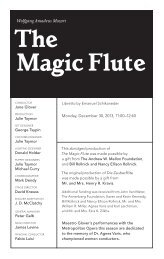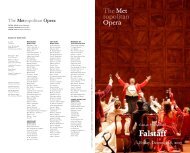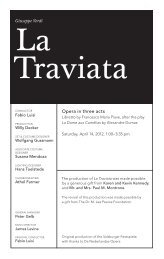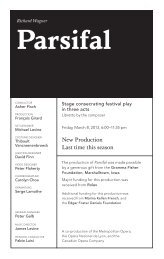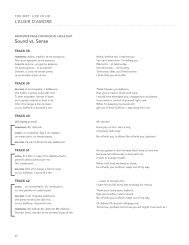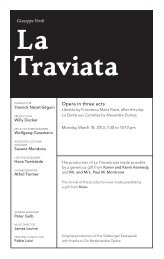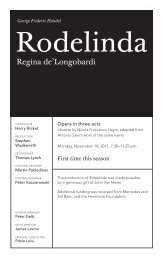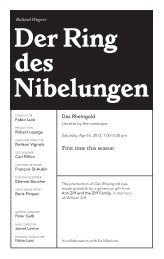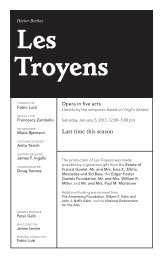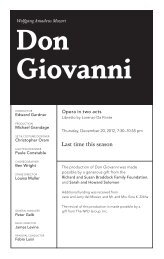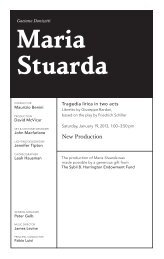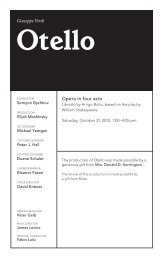Charles Gounod Faust - Metropolitan Opera
Charles Gounod Faust - Metropolitan Opera
Charles Gounod Faust - Metropolitan Opera
Create successful ePaper yourself
Turn your PDF publications into a flip-book with our unique Google optimized e-Paper software.
for religious music is apparent in the magnificent chorale invoked against<br />
the devil’s power in Act II and, by way of parody, in the devil’s own music that<br />
oppresses Marguerite in the church scene in Act IV. The chorus is featured<br />
prominently and in very different ways throughout the opera, from the rousing<br />
and unforgettable Soldiers’ Chorus in Act IV to the ethereal singing of the<br />
angels in the finale. But it is the diverse music for the lead roles that has assured<br />
this opera’s place in the repertory. Their solos are among the most cherished in<br />
opera: the tenor’s lyrical greeting of his beloved’s humble home in Act III (“Salut!<br />
demeure chaste et pure”); the bass-baritone’s infernal drinking song in Act II<br />
(“Le veau d’or”) and his ribald, mocking laughing song in Act IV (“Vous qui faites<br />
l’endormie”); the baritone’s ravishing farewell aria in Act II (“Avant de quitter ses<br />
lieux”); and above all the soprano’s coloratura extravaganza, the famous Jewel<br />
Song in Act III (“Ah! Je ris de me voir si belle”). The inherent beauty and charm<br />
of these solos often disguise their technical difficulty—each of them requires<br />
an extraordinary level of breath control and musical taste to be brought to life.<br />
This becomes even more pronounced in the memorable passages for multiple<br />
voices, such as the Act III quartet, which deftly combines romantic and comic<br />
elements, and most notably in the soaring trio for soprano, tenor, and bass that<br />
forms the opera’s musical and dramatic climax.<br />
<strong>Faust</strong> at the Met<br />
The first <strong>Metropolitan</strong> <strong>Opera</strong> House, on Broadway and 39th Street, opened with<br />
a performance of <strong>Faust</strong>, sung in Italian, on October 22, 1883. The work remained<br />
the most frequently heard opera at the Met well into the 20th century. Between<br />
1886 and 1889 it was performed in German, then reverted to Italian and finally<br />
to the original French. An 1891 tour performance in Chicago for the first time<br />
brought together the impressive lineup of Emma Eames (Marguerite) and<br />
brothers Jean (<strong>Faust</strong>) and Edouard de Reszke (Méphistophélès). Jean de Reszke<br />
went on to sing the title role 71 times at the Met, while Edouard performed<br />
the part of the devil an astounding 112 times through 1903. The other great<br />
Méphistophélès of this era was Pol Plançon, who appeared 85 times between<br />
1893 and 1908. Designer Joseph Urban and conductor Pierre Monteux made<br />
their joint Met debuts with a new production in 1917 that starred Geraldine Farrar<br />
and Giovanni Martinelli. Among the artists who appeared in this version over<br />
the following decades were Licia Albanese, Dorothy Kirsten, Frank Guarrera,<br />
and Ezio Pinza. It was replaced in 1953 by the debut production of Peter Brook,<br />
designed by Rolf Gérard and again conducted by Monteux, with Jussi Björling,<br />
Victoria de los Angeles, and Robert Merrill as Valentin. Opening night of 1965<br />
witnessed the debut Met production of Jean-Louis Barrault, who directed<br />
Nicolai Gedda, Gabriella Tucci, and Cesare Siepi, with Georges Prêtre on the<br />
podium. Harold Prince made his Met debut with a 1990 production that featured<br />
Neil Shicoff, Carol Vaness, and James Morris. In 2005 director Andrei Serban<br />
and Met Music Director James Levine helmed another new staging that starred<br />
Roberto Alagna, Soile Isokoski, René Pape, and Dmitri Hvorostovsky. The current<br />
production opened November 29, 2011, with Yannick Nézet-Séguin conducting<br />
Jonas Kaufmann, Marina Poplavskaya, and Pape in the leading roles.<br />
Visit metopera.org<br />
37



